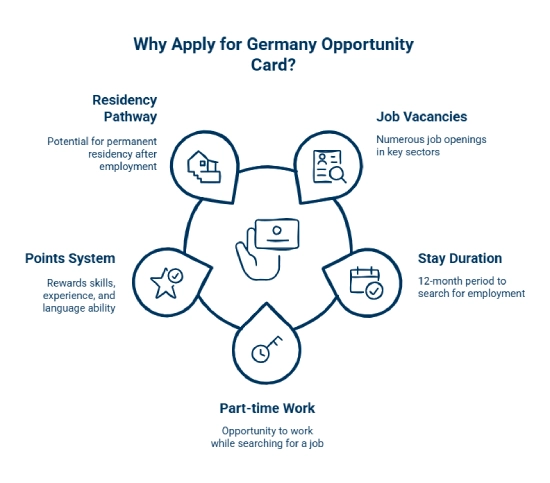
The Germany Opportunity Card offers skilled professionals from non-EU countries a chance to live and job hunt in Germany for up to one year.
*Looking to work in Germany? Let Y-Axis assist you with the process.
The Chancenkarte, also known as the Germany Opportunity Card, is a new residence permit introduced in 2024 for skilled workers from non-EU countries. It allows eligible individuals to enter Germany and search for a job for up to 12 months. The visa is based on a transparent points system that evaluates qualifications, work experience, language proficiency, and age. During their stay, holders of the Chancenkarte can work part-time (up to 20 hours per week) to support themselves. This initiative is part of Germany’s strategy to attract global talent and address its skilled labour shortage.
*Want to apply for a Germany Opportunity Card? Sign up with Y-Axis to help you with the steps.
| Factor | Germany Opportunity Card (Chancenkarte) | Germany Job Seeker Visa |
| Purpose | To search for a job in Germany using a points-based system | To search for employment in Germany |
| Eligibility Criteria | Minimum 6 points on the points-based system; degree or vocational training | Recognized degree or equivalent and relevant work experience |
| Points-Based System | Yes – Minimum 6 out of 14 points required | No – Not points-based |
| Valid Duration | Up to 1 year (with potential for extension if job is found) | Up to 6 months |
| Part-Time Work Allowed? | Yes – Up to 20 hours/week during job search | No – Part-time work is generally not permitted |
| Job Offer Requirement | Not required initially | Not required initially |
| Extension Possibility | Can be extended or converted to a work visa on employment | Must switch to work visa after job offer |
| Language Requirements | Minimum A1 German OR B2 English (for some points) | Generally A2/B1 level of German recommended |
| Settlement Pathway | Can lead to work visa, PR, and eventually citizenship | Can transition to work visa, PR, and citizenship |
| Financial Proof | Required – proof of sufficient funds or a blocked account | Required – proof of sufficient funds or a blocked account |
| Target Audience | Non-EU skilled workers (including UK residents) | Non-EU professionals with specific qualifications |
| Launched | Jun-24 | Existing scheme, not new |
The Germany Opportunity Card offers a structured and flexible way for skilled non-EU professionals, including UK residents, to explore employment opportunities in Germany. It provides a legal and transparent pathway to live and work in one of Europe’s strongest economies, even without a prior job offer.
The Germany Opportunity Card uses a transparent points-based system to assess eligibility for skilled professionals seeking jobs in Germany.
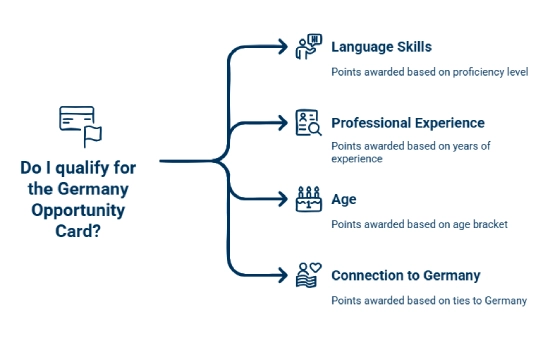
Applicants must score a minimum of 6 points to qualify, based on the below factors:
| Criteria | Maximum points |
| Age | 2 |
| Qualification | 4 |
| Relevant work experience | 3 |
| German Language Skills/English Language Skills | 3 or 1 |
| Previous stay in Germany | 1 |
| Spouse qualifying for opportunity card | 1 |
| Total | 14 |
The eligibility criteria for a Germany Opportunity Card (GOC):
| Language | Levels of proficiency |
| German tests | A1 (understand simple German sentences) |
| A2 (basic knowledge) | |
| B1 (intermediate) | |
| B2 (good Intermediate) | |
| C1 (advanced knowledge) | |
| C2 (excellent knowledge / mother-tongue level) | |
| English tests | TOEFL |
| IELTS | |
| Cambridge Certificate |
To qualify for the Germany Opportunity Card, applicants must meet specific requirements set by German immigration authorities.
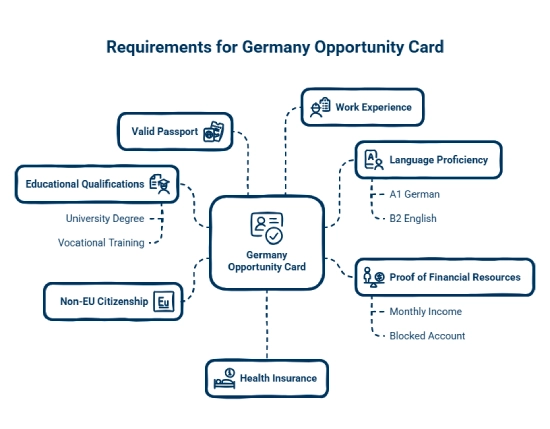
You can follow the below steps to apply for an Opportunity Card in Germany:
Step 1: Check eligibility based on points and criteria
Step 2: Gather required documents
Step 3: Get qualifications recognized in Germany
Step 4: Apply at the German embassy or consulate
Step 5: Wait for processing and approval
Step 6: Travel to Germany and register your address
The Germany Opportunity Card (Chancenkarte) application typically costs around €75. This fee may vary slightly depending on the German mission or consulate where you apply.
The processing time for the Germany Opportunity Card (Chancenkarte) typically ranges from 4 to 6 months, depending on factors such as the applicant's country of residence, the completeness of the application, and the workload of the German consulate or immigration office handling the case. Applicants are advised to apply well in advance of their intended move date to accommodate any potential delays.
Germany offers a thriving job market with over 1.8 million job vacancies as of 2024, particularly in sectors like healthcare, IT, and engineering. With an aging population and a skilled labour shortage, Germany actively seeks qualified international professionals to fill these roles under various visa programs such as the Opportunity Card and Blue Card.
The table below has details of the top in-demand jobs in Germany:
| Most in-demand jobs in Germany | |
| Green Tech Jobs | Finance and Administration |
| Software and System Developers | Hotel and restaurant industry – Chefs |
| IT specialists/Executives | Healthcare – Doctors, nurses, midwifery, dentists, medical secretaries, care administrators |
| Systems analysts and IT architecture | Teachers – Preschool and primary school teaching |
| Engineers | Electrician |
| Sales and Marketing | Manufacturing |
Immigration plays a vital role in sustaining Germany’s economy and workforce, especially in light of its aging population and labour shortages.
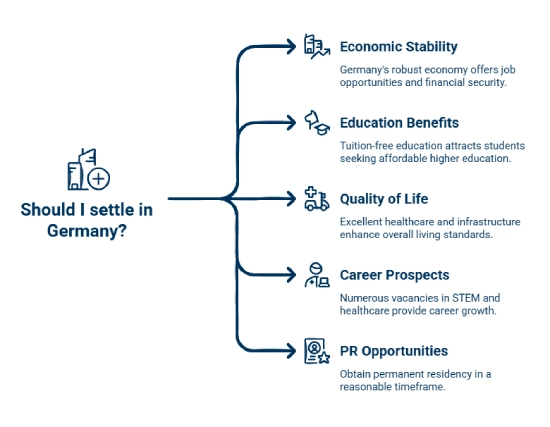
Y-Axis is the leading immigration consultant for individuals looking for German immigration. Our end-to-end support with the immigration process ensures that you make the right decision at every step.
We guide you with:
Contact us to enhance your chances and make an informed decision for Germany immigration.
Our Accreditations | |||
 |  | 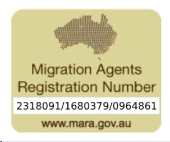 |  |
Explore what Global Indians have to say about Y-Axis in shaping their future
Germany Opportunity Card Visa
Y-Axis Client Likith Kanalli on His Germ
Read More...
Germany Job Search
One of our client Vamsi has opted for Ge
Read More...
Germany Jobseeker Visa
Y-Axis received a great feedback from Po
Read More...
You can follow the below steps to apply for a Germany Opportunity Card:
Step 1: Check eligibility criteria
Step 2: Gather all required documents
Step 3: Complete the application form
Step 4: Book an appointment and submit your application at the German mission
Step 5: Pay the visa fee and wait for approval to receive your Opportunity Card
Applicants must show proof of sufficient financial means to support themselves in Germany. As of 2024, the required monthly amount is around €1,027, or approximately €12,324 annually. This requirement can be met through a blocked account or a formal declaration of commitment from a German resident.
Yes, the Opportunity Card is specifically designed for skilled workers from non-EU countries. To qualify, you need to hold recognized qualifications or a university degree and meet other eligibility requirements, including a points-based assessment.
The eligibility criteria for Germany Opportunity Card is as follows:
Yes, there is a points system used to assess eligibility for the Germany Opportunity Card, and several online calculators are available to help applicants estimate their score. The system is designed for candidates without a job offer and evaluates key factors such as education, work experience, language skills, age, and ties to Germany.
To qualify, you must score at least 6 points based on the following:
4 points
3 points
2 points
1 point
You must score a minimum of 6 points based on education, experience, age, language skills, and ties to Germany. This score helps ensure you are well-positioned to integrate into the German workforce.
Points can be earned through:
Yes, you may still apply. While being in a high-demand occupation adds points, it is not mandatory. If you meet the other eligibility criteria and earn at least 6 points, you remain eligible for the Opportunity Card.
IELTS is not mandatory. You can prove English language proficiency at the B2 level through various accepted tests, including IELTS. Alternatively, you can demonstrate German language skills at A1 or above, which can also help increase your points.
No. The Opportunity Card does not support immediate family reunification. Only the primary applicant may enter with this visa. Once you secure full-time employment and successfully convert to a work permit such as a Skilled Worker visa or EU Blue Card, you can then apply to bring your spouse and children under Germany’s family reunification rules.
Unlike the traditional Job Seeker Visa (up to six months), the Opportunity Card grants a full year to search for work, and crucially, permits part‑time employment (20 h/week) and two‑week trial jobs per employer. Language requirements are also more lenient: German A1 or English B2 suffices, compared to higher German proficiency typically required for job seeker visas.
You must obtain German health insurance coverage from approved providers before arrival. Reputable online platforms like Expatrio, Fintiba, or PKV/gesetzliche Krankenversicherung plans offer tailored options for international applicants. Choose basic plans with full coverage during your job search year.
Yes, real-life success stories are valuable for understanding the application process, timelines, and job search experience in Germany. Platforms like Simple Germany and Settle-in-Berlin feature personal accounts from applicants who transitioned from the Opportunity Card to employment or other residence permits.
Additionally, Y-Axis has supported numerous clients in securing the Germany Opportunity Card. Many of them have shared positive feedback after successfully relocating, finding trial jobs, and converting their stay into long-term opportunities. These testimonials reflect our expertise in guiding applicants through document preparation, German-format CV writing, and pre-departure support.
You may extend your stay for up to two additional years if you secure a qualified full-time job in your field and apply to change to a skilled worker permit at your local foreigners’ authority. You will need employer documentation and proof that the job matches your qualifications. Extensions are discretionary and not guaranteed automatically.
Initially, many holders live in shared flats (WGs), student dormitories, or short-term furnished rentals for flexibility and affordability. Once employed, you can transition to private rentals. Platforms like WG-Gesucht, Immowelt, and regional expat housing groups are widely used.